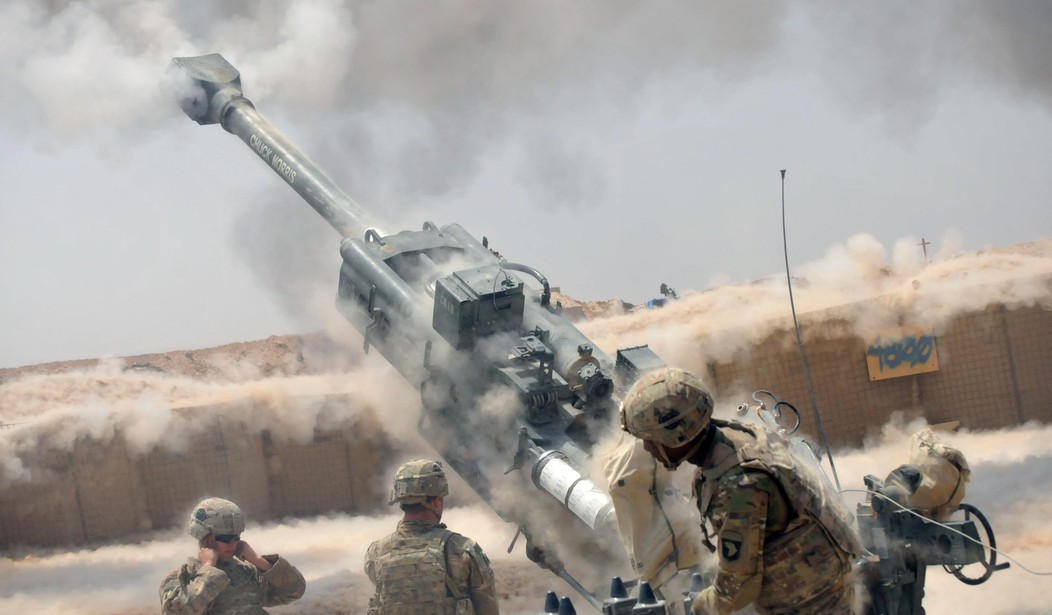ARLINGTON, Va. — The battle to retake what was before ISIS the fifth largest city in Iraq is inching closer to finally kicking off, with a spokesman for U.S. operations telling reporters today that Iraqi brigades have nearly wrapped up their training.
Analysts have been speculating for months that kicking ISIS out of Mosul, their Iraqi capital in the caliphate, could be an October surprise from the White House in the run-up to Election Day.
But the timetable of an assault has been unclear as forces get in place and receive needed training.
State Department press secretary John Kirby issued a statement Tuesday addressing recent media reports that “have speculated on the role that international forces will play in the Iraqi operation to liberate Mosul.”
“As we have repeatedly made clear, the United States supports Iraqi unity and sovereignty. To that end, we believe all international forces in Iraq should be there with the approval of and in coordination with the Government of Iraq, under the umbrella of the Coalition,” Kirby said. “It is imperative for all parties to coordinate closely over the coming days and weeks to ensure unity of effort in defeating Daesh and to provide for the lasting security of the Iraqi people.”
Air Force Col. John Dorrian, spokesman for Operation Inherent Resolve, told reporters via teleconference from Baghdad today that “shaping operations and planning for liberation of Mosul… are ongoing.”
“The size of Mosul makes this by far the largest task the [Iraqi Security Forces] has undertaken to date, an order of magnitude larger than the liberation battles in cities like Ramadi, Fallujah and Sharqat,” Dorrian said. “Nearly all of the 12 Iraqi brigades the coalition is training have completed their instruction. The last brigade will finish in the next couple of weeks.”
“The government of Iraq is working with the UN and non-government organizations to plan for the internally-displaced persons that may flee the fighting in Mosul. The government of Iraq is directing 20 internally displaced person camp sites and is working with the UN and NGOs to pre-position resources to take care of IDPs.”
ISIS has killed families trying to flee their occupied cities.
Turkey says it wants to participate in the operation to liberate Mosul, but the Iraqi government doesn’t want them taking part in the operation. The PKK has also said it wants to take part. The U.S. is “not making any plans to change the plan” as a result of the Turkey rift.
“What we would encourage is continued diplomatic efforts to resolve this matter between Iraq and Turkey,” Dorrian said. “…Any group that wants to fight Daesh should do so only in coordination with — and it’s with the permission of the government of Iraq. If you wanna fight Daesh in this country, you should coordinate your activities with the government of Iraq.”
Asked what coalition forces are currently observing in Mosul, the spokesman said the activity is “kind of a lot of what we’ve been seeing up until then.”
“Daesh has been there for two years, they’ve done very elaborate defenses. They have fighting positions, they have tunnels. And what we do is we try to shape the battlefield to the extent that we can in order to set conditions for the Iraqis to go in there,” he said.
“So whenever Daesh continues to build fighting positions, whenever we’re able to attack those with precision in order to avoid civilian causalities, we do so. This is a part of our battle rhythm to go against fighting positions, and at the same time, we continue to attack leadership figures whenever they can be found in Mosul. So those efforts are ongoing, as well.”
Dorrian said the coalition believes “that we can create some pretty disruptive effects to Daesh command and control in the city.”
“But all these things have been ongoing for some time. Certainly they’ll intensify as the efforts for the Iraqis to liberate the city begin,” he added.
ISIS is expected to seize urban warfare opportunities “to do things like hide behind civilians, hide behind internally displaced persons, and attempt to slip out with them.”
“Again, they’ve had an opportunity to dig some pretty elaborate defenses and put up a lot of booby traps,” Dorrian said. “All these things cause delays and challenges, but they’re also things that as we train the Iraqis to go into Mosul, a lot of them have received specialized training like explosive ordnance disposal, sniper training, breech training, and there have been warfare trained so they know how to clear buildings and all these sorts of things.”
“So, we believe that the Iraqis are well positioned to be successful and of course we’ll be there with our strikes so that as the enemy becomes evident, we’ll strike them and help the Iraqis advance.”
He confirmed there “are fighters that are moving in and out of the city in small numbers.”
“So they don’t have the ability to move out in large columns or convoys or that sort of thing. But they do still, you know, have the ability to move our in single digits. You know, with backpacks and that sort of thing. That’s not — that’s a trickle, not a flow of fighters,” Dorrian said. “…As to who they are, if we knew that with that much fidelity we probably would have struck them. So we continue our work to track and strike leadership figures.”
After ISIS is pushed out of Mosul, the plan is “to use tribal forces and police forces that have been through coalition training as the hold force and a wide-area security force.”
As far as the timetable, Dorrian said what the Pentagon has been saying all along: “The Iraqi Security Forces at a timeline of their choosing are going to go into Mosul and they’re going to be supported by coalition forces.”









Join the conversation as a VIP Member